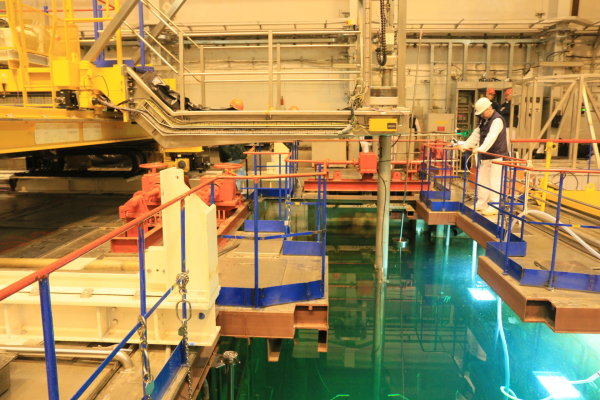Fuel Debris Recovery Project
2023

Ignalina Nuclear Power Plant (‘INPP’) is pleased to announce the successful completion of the Fuel Debris Recovery Project (Project 3103) an important nuclear safety related activity of the ongoing Programme of Nuclear Decommissioning at INPP commenced on August 10th 2020 and completed on December 30th 2022, supported by the specialist expertise of main Contractor Höfer & Bechtel GmbH.
The Project was financially supported by the Ignalina International Decommissioning Support Fund (IIDSF) supported by the European Union and administrated by the European Bank for Reconstruction and Development.
The following summary presents details of the successfully completed Fuel Debris Recovery Project and lessons learned by the INPP team during the Contract implementation.
Summary.
The arrangement of the INPP spent fuel storage pool system on each Unit 1 and 2, consists of 12 storage pools:
- 3 pools (Rooms 236/1, 236/2, 234) used for cooling and temporary storage of spent fuel assemblies;
- 6 pools (Rooms 336, 337/1, 337/2, 338/2, 339/1, 339/2) used for storing spent fuel bundles in 32 M baskets;
- 1 pool (Room 338/1) used for loading containers with spent fuel baskets;
- 2 transport canals (Room 157 and 235) used for transferring fresh/spent fuel.
Storage pools Nos. 234, 235, 236/1, 236/2 in the Units 1 and 2 were chosen for cleaning as previously had been in use for handling with Spent Fuel Assemblies and as a result could contain Fuel Debris pellets on the pool floor.
Initially, the conditions to clean the bottom of the Storage Pools in the Units 1 & 2 were very difficult due to a significant quantity of large parts submerged and covered in a sludge layer on the pool floors including a number of long rods, parts of radioactive special tooling, different forks, graphite rings, lead sheets and shots used as a weighing material of сanisters and other miscellaneous scrap materials. All of the above-mentioned pieces were covered by a 10-15 cm thick layer of sludge organic matter / dust / metal particles formed during the many years of operation of the Storage Pools.
The real conditions for the Fuel Debris Recovery Project only became apparent during the first video inspection made using modern, advanced underwater high resolution video systems and powerful underwater floodlighting provided in the scope of supply by Contractor Höfer & Bechtel GmbH.
Based on the initial Fuel Debris Recovery Project Programme, following approval by INPP of the Höfer & Bechtel GmbH Technical Design documentation and manufacturing, testing and supply of necessary equipment, the activities to clean the Storage Pools in the SPH Unit 1 and perform underwater video surveys commenced in September 2021 and were completed in September 2022 using Höfer & Bechtel GmbH specially designed underwater filtration cleaning systems and tools.
The activities to clean the Fuel Storage Pools in the Storage pools of Unit 2 commenced in July 2022 and were completed in December 2022, i.e. the duration of works performance required was reduced by half as a result of the experiences and improved efficiency of the INPP team in preparing the Storage pools.
In successfully completing the Fuel Debris Recovery Project:
- No accidents or incidents or near misses were reported / recorded during the implementation of the Fuel Debris Recovery Project;
- The overall area of the pools (depth 18 m) for cleaning / video survey was 185 m2 and the water volume was 3000 m3 in each Unit;
- Unit 1 - 1300 filter bags were used to clean the pools bottom from sludge deposits;
- Unit 2 - 1200 filter bags were used to clean the pools bottom from sludge deposits;
- 1000 pieces (400 in Unit 1 and 600 in Unit 2) of large/smalls size items, lids, neutron detectors, panel lids, parts of control rods, grabs for transferring specials (special products/tools) were safely lifted from the bottom of the pools with a total mass of 500 kg;
- Approximately 2,3 m3 of filter bags with wastes (e.g. sludge, sand, rubber pieces, etc.) were loaded into K100 containers and removed from the Units 1 & 2 before being transferred into suitable Long Lived Intermediate Waste containers;
- Approximately 12 pieces of 200 litre drums were removed from each Unit to Solid Waste Management and Storage Facility (B34). When the drums were monitored via the facility MST6 they were reloaded into the Short Lived Low and Intermediate Waste containers.
INPP Lessons Learned.
Close cooperation between the Höfer&Bechtel GmbH and the INPP team in reviewing of real time survey information, survey images and in preparation and review of survey reports enabled the timely completion of the Fuel Debris Recovery Project within time and budget.
Experience and knowledge of INPP operations team in cleaning the Storage pools, removal of large items and use and operation of underwater filtration equipment for sludge removal prior to performance of underwater surveys.
No fuel debris was identified or was found in either of the Unit 1or Unit 2 Storage Pools at Ignalina Nuclear Power Plant. This is not unusual and may be due to the storage of defective fuel assemblies in special cases and the heavily damaged fuel assemblies were handled in the working tray and their debris contained within these cases was recovered already with the appropriate Fuel Debris Recovery System vacuum equipment. These reasons were described in both final underwater Survey Reports for Unit 1 and Unit 2. Also, the analysis of patterns (collation map) of dose rate and neutron radiation (emission) measurements of the lower part of the Storage Pools Nos. 234, 235, 236/1, 236/2 in the Units 1 and 2 was made. The analysis did not discover any presence of neutron flux that is a typical indicator for a significant amount of Nuclear Fuel Debris.
Currently, INPP is the first and only RBMK type reactor Power Plant in the world to have performed the cleaning of the bottom of Fuel Storage Pools in both its Units and confirmed that all Spent Nuclear Fuel including Nuclear Fuel debris/pellets have been safely removed and stored in Fuel Storage Casks (CONSTOR®RBMK-1500/M2 at INPP Interim Spent Fuel Storage Facility (‘ISFSF’)).
The EBRD-managed Ignalina International Decommissioning Support Fund is supported by the European Union, which has provided 96 percent of the contributions. Contributions to the Fund have also been made by Austria, Belgium, Denmark, Finland, France, Germany, Luxembourg, Netherlands, Norway, Poland, Spain, Sweden, Switzerland and the United Kingdom.

